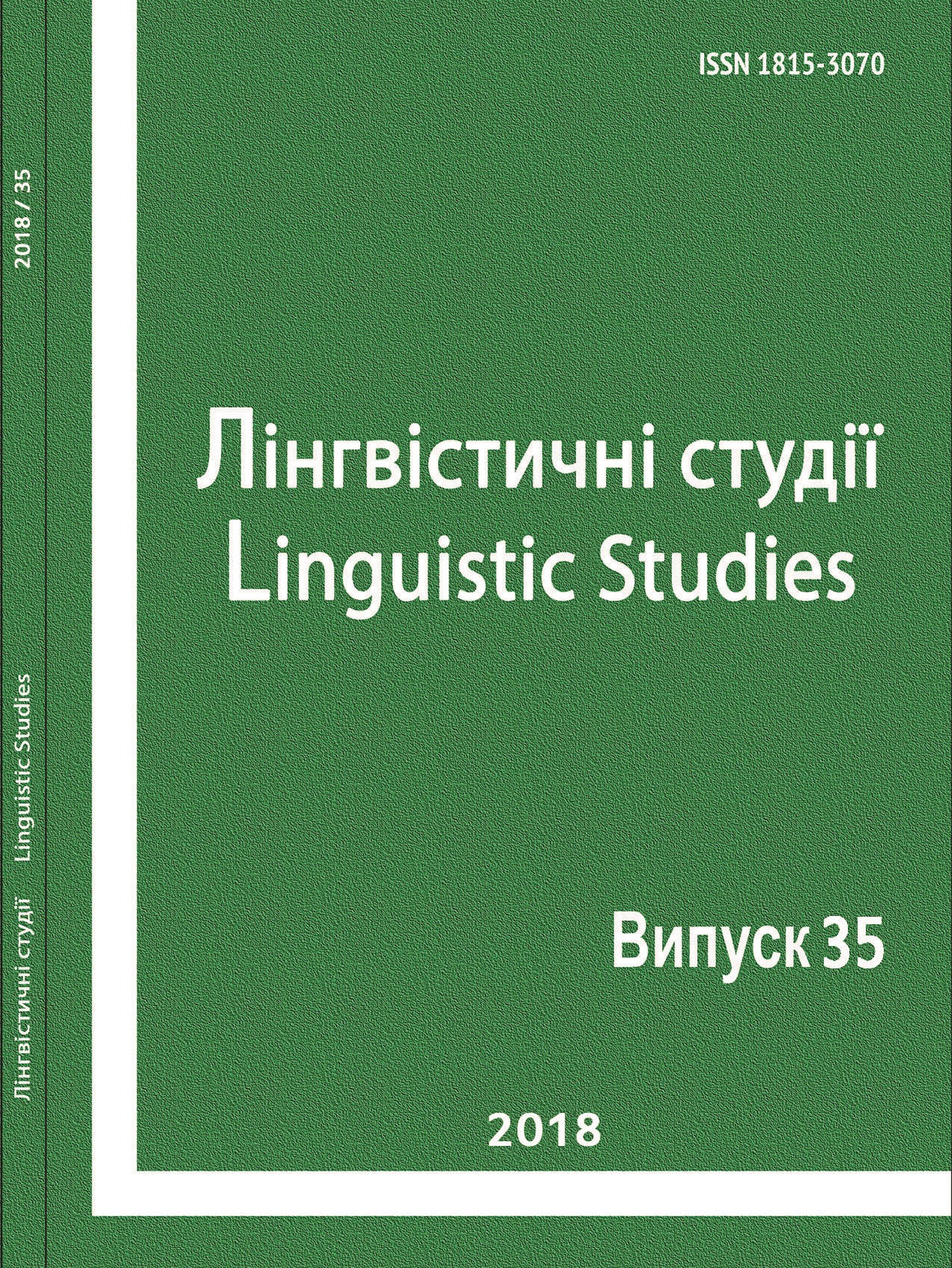Образний компонент як невід’ємна частина семантичної структури слова.
DOI:
https://doi.org/10.31558/1815-3070.2018.35.10Ключові слова:
семантична структура слова, образний компонент, лексичне значення, лексико-семантичний варіант словаАнотація
У статті розглядається місце образного компонента як невід’ємної частини у структурі лексичного значення слова. Оглядаються сучасні класифікації семантичних компонентів у структурі лексичного значення слова. Простежується кореляція образного компонента з іншими компонентами конотації. Досліджується лексикографічна фіксація образного лексико-семантичного варіанта слова та визначаються його специфічні риси.Посилання
Allwood, Jens. “Meaning potential and context. Some consequences for the analysis of variation in meaning.” Cognitive approaches to lexical semantics. Berlin: Mouton de Gruyter, 2003. pp. 29–65. Print.
Aristotle. “Ritorika. Poetika (Rhetoric and Poetics).” Moscow : Labirint, 2000. Print.
Arnold, Irina. “The English Word (Lexicology of English Language).” Moscow. Visshaya Shkola, 1986. Print.
Bebchuk, Elena. “Obraznyi komponent v leksicheskom znacheniyi russkogo sushchestvitel’nogo (Figurative component in the lexical meaning of a Russian noun).” Diss.Voronezh, 1991. Print.
Belekhova, Larisa. “Obrazniyi prostir amerikans’koiyi poeziyi : lingvokognitivniyi aspekt (Figurative field of American poetry : linguistic and cognitive aspects)”. Diss. Kyiv linguistic university. Kyiv, 2002. Web. 12.03.2010.
Blinova, Olga. “Obraznost’ kak kategoria leksikologiyi (Figurativeness as a lexicological category. Lexis and phraseology expressiveness”. Scientific digest (1983): 3–11. Print.
Buldakov, Vladimir. “Konnotatsia v znamenatel’noy leksike i frazeologiyi sovremennogo nemetskogo yazika (Connotation in categorimatic lexis and phraseological units of modern German language).” St. Petersburg, 2011. Diss. Web. 22.01.2018.
Coulson, Seana and Oakley, Todd. Blending and coded meaning: Literal and figurative meaning in cognitive semantics / Journal of Pragmatics 37. 2005. pp. 1510–1536. Web. 16.04.2018.
Ginzburg R. S., Khidekel S. S., Knyazeva G. Y., Sankin A. A. “A Course in Modern English Lexicology.” Visshaya shkola. Moscow, 1979. Print.
Giora, Rachel. Literal vs. figurative language : Different or equal? Journal of Pragmatics, 34/4. – 2002. – P. 487–506. Web 16.04.2018.
Goverdovsky, V. I. “Opit funktsional’nogo tipologicheskogo opisaniya konotatsiyi (Practice in Functional Typological Description of Connotation)”. Moscow, 1977. Abstract. Print.
Karasik V. I. Status of the person in the meaning of the word. – Volgograd: Izdv-VGPI, 1989. – 112 p. Print.
Kustova, Galina. “Tipy proizvodnikh znacheniyi i mekhanizmy yazikovogo rasshireniya (Types of derivative meanings and mechanisms of language extention)”. Moscow, Yaziki slavyanskoy kul’tury, 2004. Print.
Lebedeva, Maria. “Obraznye aspecty v semantike angliyskih sushchestvitel’nyh (Figurative aspects in semantics of English nouns)”. Moscow, 1981. Print.
Levyts’kyi, V. V. “Leksikologia nimets’koiyi movy (Lexicology of German language)”. Kyiv : Nova Kniga, 2014. Web. 23.01.2018.
Mel’nychuk, N. “Emotyvnist’ ta ekspresyvnist’ yak osnovni komponenty konotastiyi adjectyviv angliys’koyi movy (Emotiveness and expressiveness as main components of connotation in English adjectives).” Vinnitsa : Naukovi zapysky (2014) : 152–157. Web. 22.01.2018.
Norén, Kerstin and Linell, Per Meaning Potentials and the Interaction between Lexis and Contexts: An Empirical Substantiation Pragmatics. International Pragmatics Association. – 2007. – P. 387–416. Web. 16.04.2018
Peftieva, Olena. “Figurativeness as a semantic component of lexical meaning in designations of person in English and Ukrainian languages.” Nestroyevoy. Kyiv, 2015. Print.
Peftieva, Olena. “Genesis of figurative lexico-semantic variant of a word.” DonNU (Vinnitsa). Linguistic studies (2016) : 45–50 Print.
Sternin, I. A. Problemy analiza struktury slova (Problems of Analysis of Word Structure). Moscow-Berlin : DirectMEDIA, 2015. Web. 32.01.2018.
Yurina, Elena “Kompleksnoey issledovanie obraznoy leksiki Russkogo yazika (Complex study of Russian figurative lexis).” Diss. Tomsk, 2005. Abstract. Web. 20 Jan. 2018.


